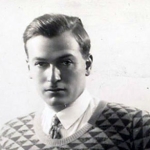Women’s tears are but water;
The tears of men are blood.
He sits alone in the firelight
And on either side drifts by
Sleep, like a torrent whirling,
Profound, wrinkled and dumb.
Circuitously, stealthily,
Dawn occupies the city;
As if the seasons knew of his grief
Spring has suddenly changed into snow
Disaster and sorrow
Have made him their pet;
He cannot escape their accursed embraces.
For all his dodgings
Memory will lacerate him.
What good does it do to wander
Nights hours through city streets?
Only that in poor places
He can be with common men
And receive their unspoken
Instinctive sympathy.
What has life done for him?
He stands alone in the darkness
Like a sentry never relieved,
Looking over a barren space,
Awaiting the tardy finish.


Comment form: